Introduction
Are you ready to make your voice heard? Do you have a message that deserves to be shared with the world? Then it’s time to dive into the exciting world of podcasting! Starting a podcast may seem like a daunting task, but fear not! Our comprehensive guide will take you by the hand and lead you through the process step by step.
In this blog we show you how to start a podcast in 8 easy, actionable steps. From planning your content to promoting your episodes, we’ve got you covered. So, grab your microphone, plug in those headphones, and let’s embark on this thrilling podcasting adventure together!
According to Edison Research, the number of Americans listening to a podcast each week has grown 120% over the past four years, with 90 million Americans listening to a podcast every month. As the audience for podcasts continues to grow, there has never been a more opportune moment to start a podcast, be it for your business, or as a personal hobby. This guide will walk you through the entire process of starting your first podcast.
Why Should you Start Podcasting?
1. Audio Content is Convenient
With the rise of the internet, there has been a tremendous surge in the amount of information that can be available to us instantly, at the click of the button. It’s difficult to ignore everything else that wants your attention to focus 100% of your attention on reading an article or watching a video in its entirety.
Here’s where the convenience of podcasts comes in the fore. Since the podcast is audio content, one can listen to it while doing something else simultaneously. Your audience can multitask and listen to your podcasts while cleaning their house, driving in their car, jogging, or cooking. As opposed to video where you have to devote both of your vital senses of sight and sound, podcasts don’t require too much of your concentration as audio content is portable and convenient.
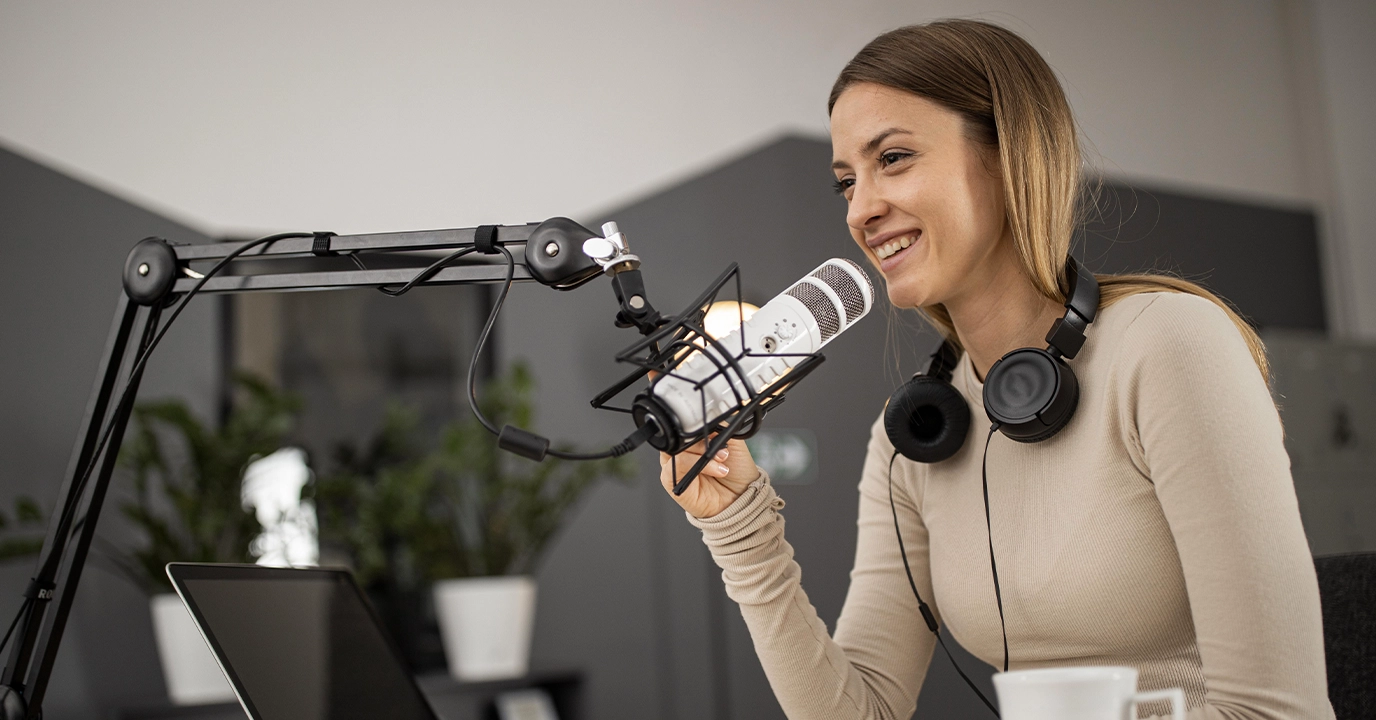
2. Low Entry Costs
Another advantage to start a podcast is its minimum involvement of expenditure as far as equipment is concerned as compared to video production. All you need to do is download a free podcasting app and you can start recording your first show.
You don’t even need expensive audio equipment as Smartphone audio recorders will give you good enough audio quality that you can clean up with the help of the podcasting app. It’s a great business for starters as you practically need no upfront investment. Of course, once you become a professional podcaster, you can create a high-end podcast studio.
3. You Increase the Value of your Brand
Podcasts let you expand your network. If you host a podcast in which you interview various guests for your show, it could be great to expand your network. A podcast is a great platform to leverage and reach out to people you might not have been able to otherwise. As your audience grows in size, your ability to reach out to the high profile experts in your industry increases.
4. Less Competition than Vlogging on YouTube
Blogging and YouTube marketing have reached the saturation point with over 10 million blog posts published every day and more than 500 hours of video uploaded to YouTube every minute. The competition for podcasts, thankfully, is still relatively new and low, so it’s still possible to get found by your listeners.

How to start a Podcast? – 8 Easy Steps
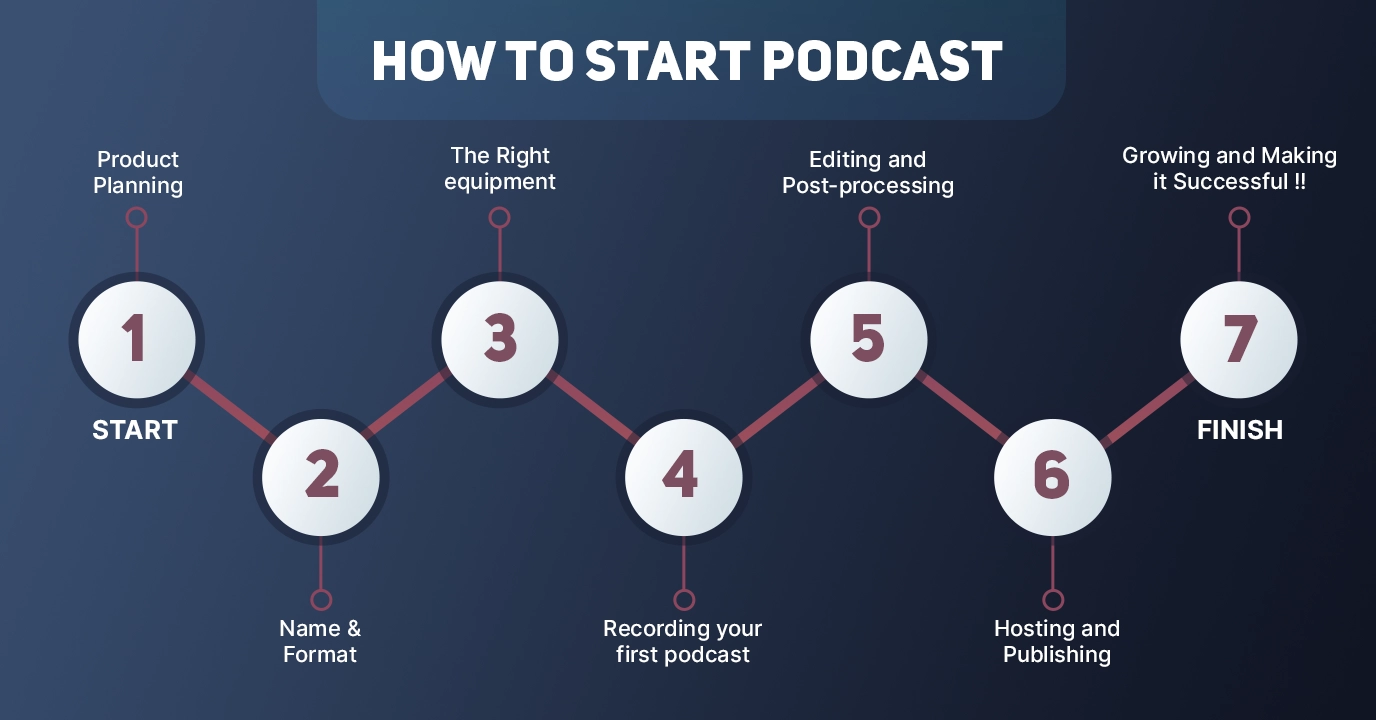
Wondering how to start a podcast? Look no further. In this guide, we will walk you through the essential steps to launch your own podcast. From planning your content and setting up the necessary podcast equipment to choosing a catchy name and logo, recording, editing, and promoting your episodes – we’ve got you covered.
1. Plan your podcast
Decide on the topic and format of your podcast. Consider your target audience, what you want to talk about, and how often you want to release episodes. Create a basic outline or script for each episode.
2. Set up your equipment
Invest in a good quality microphone and headphones. You’ll also need a computer or a smartphone with recording software. Make sure to test your podcast equipment and ensure good audio quality.
What podcast equipment do you need to get started?
To get started, you will need the following podcast equipment:
Microphone(s): A good quality microphone is essential for recording clear and professional-sounding audio. Consider getting a USB microphone or an XLR microphone that can be connected to an audio interface. USB microphones are easier to set up, while XLR microphones offer better sound quality but require additional equipment.
Headphones: A pair of closed-back headphones is important for monitoring your audio while recording and editing. They help you hear any background noise, audio issues, or inconsistencies during the recording process.
Podcast camera (optional): While not necessary for an audio-only podcast, if you plan to create video podcasts, you will need a camera. It could be a dedicated video camera or even a high-quality webcam. Ensure the camera produces clear and sharp video.
3. Choose a name and a logo
Come up with a catchy and descriptive name for your podcast. Design a simple logo or hire a graphic designer to create one for you. The name and logo should reflect the theme and personality of your podcast. For a more efficient and cost-effective solution, you can use an AI logo generator or an online tool to create a logo easily that stands out and attracts listeners to your podcast.
4. Find a place to record
Look for a quiet and comfortable space to record your episodes. It could be a spare room, a quiet corner, or even a closet with good acoustics. Consider using soundproofing materials or blankets to minimize background noise.
5. Record a few first episodes:
Start recording your podcast episodes. Follow your outline or script, but also allow for natural conversations and spontaneity. Aim for consistency in episode length and release schedule.
6. Edit your podcast recordings
Use audio editing software to clean up your recordings. Remove background noise, adjust volume levels, and edit out any mistakes or long pauses. Add intro music, transitions, or sound effects if desired. Keep the editing process simple and focus on improving audio quality.
7. Choose a hosting service for your podcast
Select a podcast hosting platform where you can upload your episodes. These services provide an RSS feed, which is necessary for publishing your podcast to various platforms like Apple Podcasts, Spotify, or Google Podcasts. Research different hosting options and consider factors like pricing, analytics, and ease of use.
Muvi One’s podcast hosting platform provides a range of features to simplify the process of hosting, distributing, and managing podcast content. It has a wide range of features to help you with these tasks. Muvi One stands out because it offers over 1000 features and is the only platform that caters to the needs of various industries through On-Demand, Live Streaming, and an online store.
With Muvi One, you can create your own branded podcast hosting apps and websites. These apps are fully featured and work on more than 20 platforms and devices including iOS, Android, Roku, Apple TV (tvOS), Amazon Fire TV, and Android TV.
8. Promote and monetize your podcast
Create a website or a social media presence for your podcast. Share your episodes on platforms where your target audience is active. Encourage listeners to leave reviews and ratings. Explore monetization options like sponsorships, advertising, or listener donations.
Muvi One allows you to monetize your podcast hosting service in various ways. You can choose the Pay per View (PPV) model for individual episodes or content. Additionally, you can set up a Subscription model (SVOD) for streaming services, where users pay a recurring fee to access your podcast.
With Muvi One, you have the flexibility to combine and set up multiple monetization models for your podcast hosting platform. It supports various payment gateways, allowing you to accept payments from your listeners conveniently. You can also offer your content in multiple currencies to cater to a wider audience.
Different Formats of Podcasting
When you start a podcast, it’s important to choose a format that fits what your podcast is about and you should be comfortable about it. When it comes to discussing podcast formats, there’s a lot to talk about. Let’s take look at the most common podcast formats:
- Interview podcasts: Interview podcasts are podcasts that feature a single host who interviews another individual within a particular industry.
- Scripted series podcast: These are podcast that feature a series and they usually represent a single theme for a full season.
- News recap: This is a podcast format that summarizes the relevant news within a specific industry.
- Educational podcasts: Scripted non-fiction podcasts that focus on teaching their audience about a particular subject.
- Monologue podcasts– In the monologue style of podcast, a single host speaks for the entirety of each episode. These podcasts are usually hosted by someone who is an expert in a given field.
- Roundtable podcasts– Roundtable podcasts, also known as panel shows, involve a consistent or rotating group of hosts who provide commentary and conversation around specific topics.
- Scripted fiction or Theatrical Podcasts : These podcasts are similar to radio dramas and have been a growing trend for years. Some theatrical podcasts consist of a single host who narrates a story in a similar manner as an audiobook.
Recording Equipment – What Equipment Do You need to Start a Podcast?
If you want to start a podcast, it’s relatively easy as you would need little overhead or even experience for that matter. If you are just starting out, you can do so by just recording on your mobile phone and a pair of headphones.
The bare minimum you need to record a podcast is a computer with a USB microphone and access to the internet. But remember, the more limited and low quality your setup and equipment is, the more limited the sound quality of your podcast will be.
If you choose the right mic, simple USB microphone setups can give good results. Plus, if you are just starting out, it’s better to see whether you are actually satisfied with the quality of your equipment before forking out big sums of money on high quality audio equipment.
If you want to deliver a professional podcast, you’ll need to spend quite a few dollars on professional equipment, including:
- Stand microphones
- Audio mixers
- Acoustic foam
- Pop filters
- Editing software
Of course, you’ll also need somewhere to record. A quiet office space or a studio room in your home is usually a good place to start. Famous podcaster Marc David Maron started recording his podcast WTF in his garage, and even interviewed former President Barack Obama there. So, don’t fret if you do not have access to a well designed and soundproof studio room.
Podcast Editing Software – To Make Your Process Easier
To start a podcast, you would need some software to actually record and edit the audio after you plug your USB microphone into your computer. The good news is that there are a few free options for acing the editing process.
1. Audacity: Audacity is one of the most popular free-of-charge audio editing applications for beginners and professionals alike. For the majority of people, it caters to all your podcasting needs.
2. Adobe Audition: A high quality Pro-level production tool, Adobe Audition is a feature rich editing software and has a great workflow, and feature-rich. It’s available through a paid subscription.
3. Alitu: The Podcast Maker: If you haven’t used editing software before, the easiest possible experience would be Alitu. This is a web app that can automate audio cleanup, and also acts as a great editing and episode building tools.
Time to Launch your Podcast!
While there are podcast hosting sites that you can use to launch your podcasts, we would recommend you to opt for a professional audio streaming/podcasting platform like Muvi to create your own podcast website/app. While an OTT platform providing solution may not be your first choice for hosting podcasts, there are quite a few advantages that an audio/video streaming solution can actually give you as far as audio-only streaming is concerned. In fact, broadcasting live/on-demand audio via a streaming solution is actually more suited to professional podcasters. Here are the reasons why you should consider Muvi as your podcast hosting solution:
Create your Podcast Website and App
Muvi lets you launch your own branded, fully featured podcast hosting apps and websites. You get fully featured native apps across 20+ platforms, devices, and ecosystems such as iOS, Android, Roku, Apple TV(tvOS), Amazon Fire TV, Android TV, and more. Most podcast hosting platforms like Spotify or iTunes will not give you this option and not to mention the fact that your brand name will get affected in the long run.
Create on-demand Podcasts
You can create and upload podcasts as on-demand content for your viewers. You can categorize the podcast playlist as per genre such as entertainment, sports, motivation, mind management, wellbeing, religion, and more. Muvi’s Advanced Enterprise Video CMS, makes it easy to manage all your streaming apps, website, and content in a single CMS.
Live Stream Podcasts
You could not only host on-demand but also live stream uninterrupted podcasts to your audience. Not only that, you could launch a fully-customized live streaming podcast hosting app and website that aligns with your brand persona. With Muvi’s DVR-enabled livestream, you can enable your listeners to pause, rewind, and replay live podcasts.
Deliver Buffer-Free Podcasts
An online video/audio service provider lets you deliver podcasts with ultra low latency by using a powerful live-streaming Content Delivery Network (CDN) for scaling to reach a global audience.
Not every solution has this functionality, however, so make sure to do your research.
Monetization Models
Monetization is a major feature which most podcast hosting platforms won’t give you. A video/audio streaming solution like Muvi provides multiple monetization options like SVoD, AVoD, TVoD to monetize your podcast based on your business requirements.
Video/audio platforms may also include some perks that podcast hosting services don’t include, including features like security, analytics, API access, 24X7 support, M3u8 playlist support, and more.
Wrapping Up
Audio streaming is a growing market you would love to tap into if you are interested in starting out a podcast. Forty-two million Americans listen to podcasts weekly. With the growing popularity of audio-only streaming, opting for an audio streaming service like Muvi can tick all your boxes when it comes to podcasting.
Take a 14-Day Free Trial to get better clarity!
FAQs
Why should I start a podcast?
Podcasting provides a platform for you to share your knowledge, experiences, and insights on topics that you’re passionate about. It allows you to establish yourself as an authority in your field and connect with like-minded individuals who share your interests. Podcasting opens doors to networking and collaboration. Through interviews and guest appearances, you can connect with experts, thought leaders, and influencers in your niche.
Do podcasts make money
Podcasting offers various monetization avenues. Once you have established a loyal audience, you can explore sponsorship deals, advertising, merchandise sales, or even crowdfunding. Additionally, your podcast can serve as a platform to promote your own products, services, or expertise, opening doors for additional revenue streams.
How much money does it cost to start a podcast?
The cost of starting a podcast can vary depending on your specific needs and goals. It’s worth noting that these are general cost considerations, and you can choose to scale your expenses up or down based on your specific requirements and financial resources. Remember that starting a podcast can be done on a budget, and you can gradually invest in additional equipment or services as your podcast grows.
What are the best features provided by muvi one to start a podcast?
- Your own branded Apps & Website
- Stream On-demand Podcasts
- Livestream Podcasts
- Secured Content Delivery
- Online Store
- Monetize Podcasts
- Real-time Analytics
What Equipment Do You Need to Start a Podcast?
- Microphone
- Headphones
- Pop Filter
- Mic Stand or Boom Arm
- Shock Mount
- Pop Filter
- Audio Interface
- Acoustic Treatment (optional)

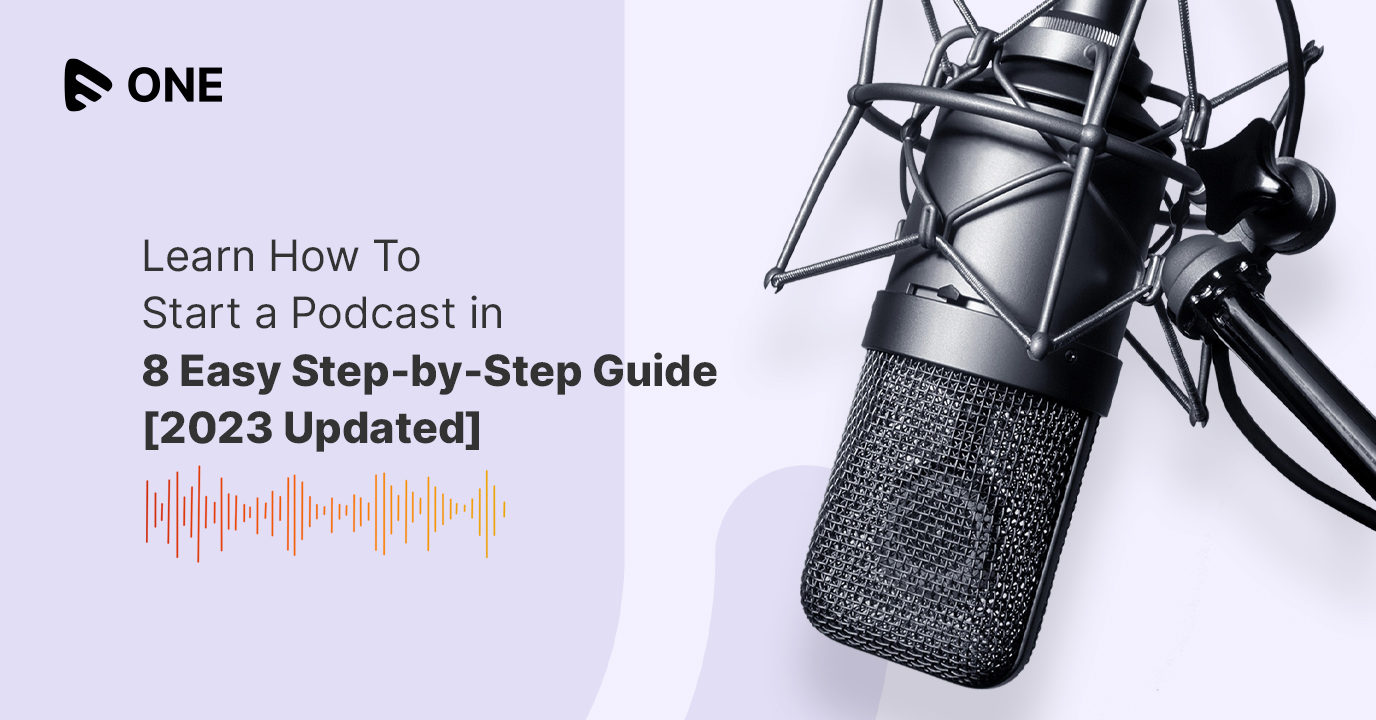





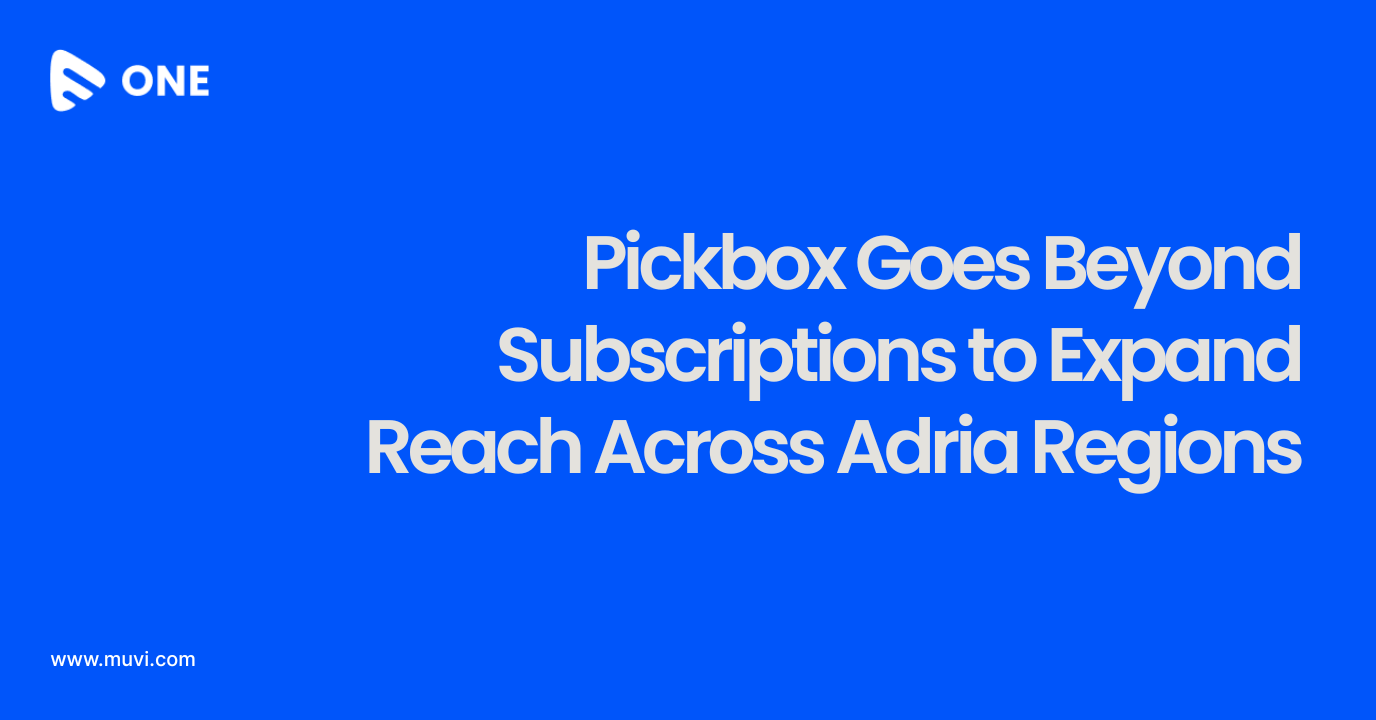
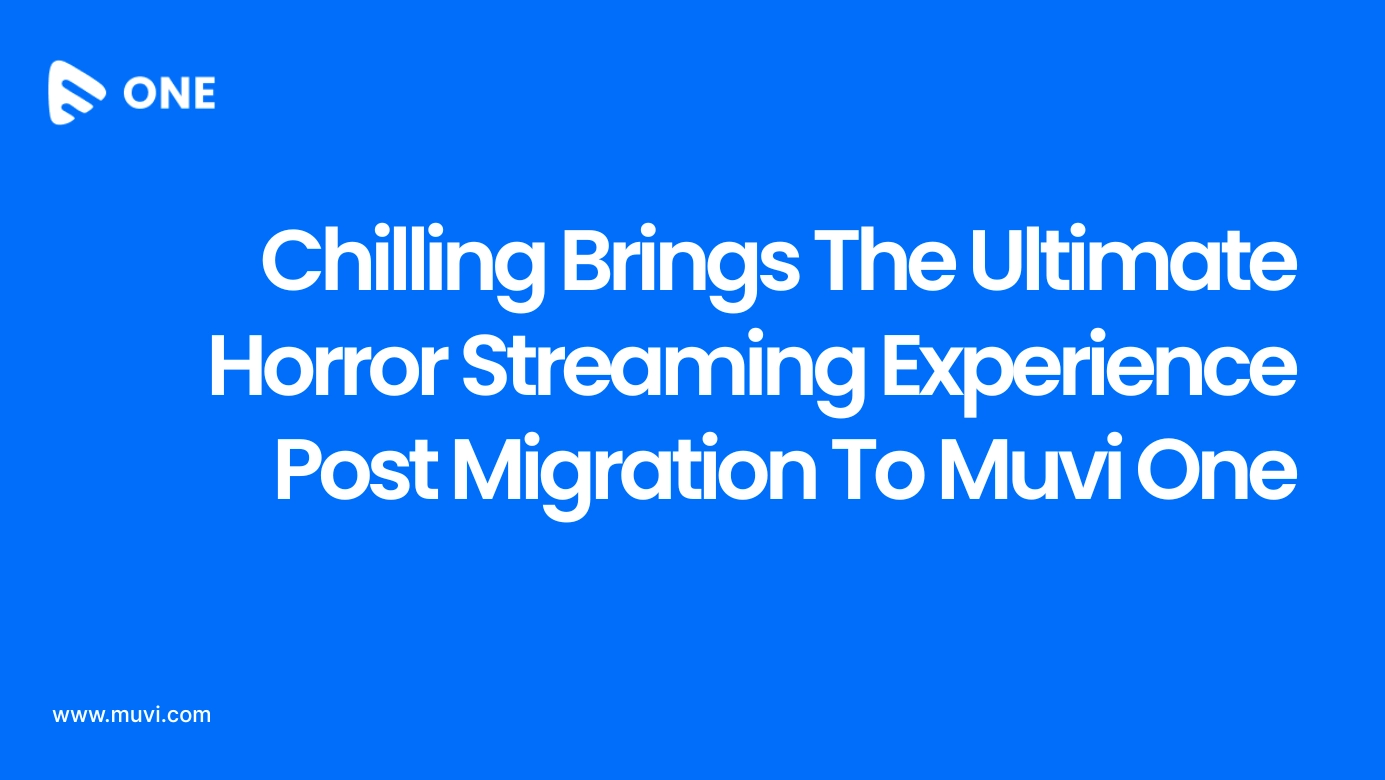
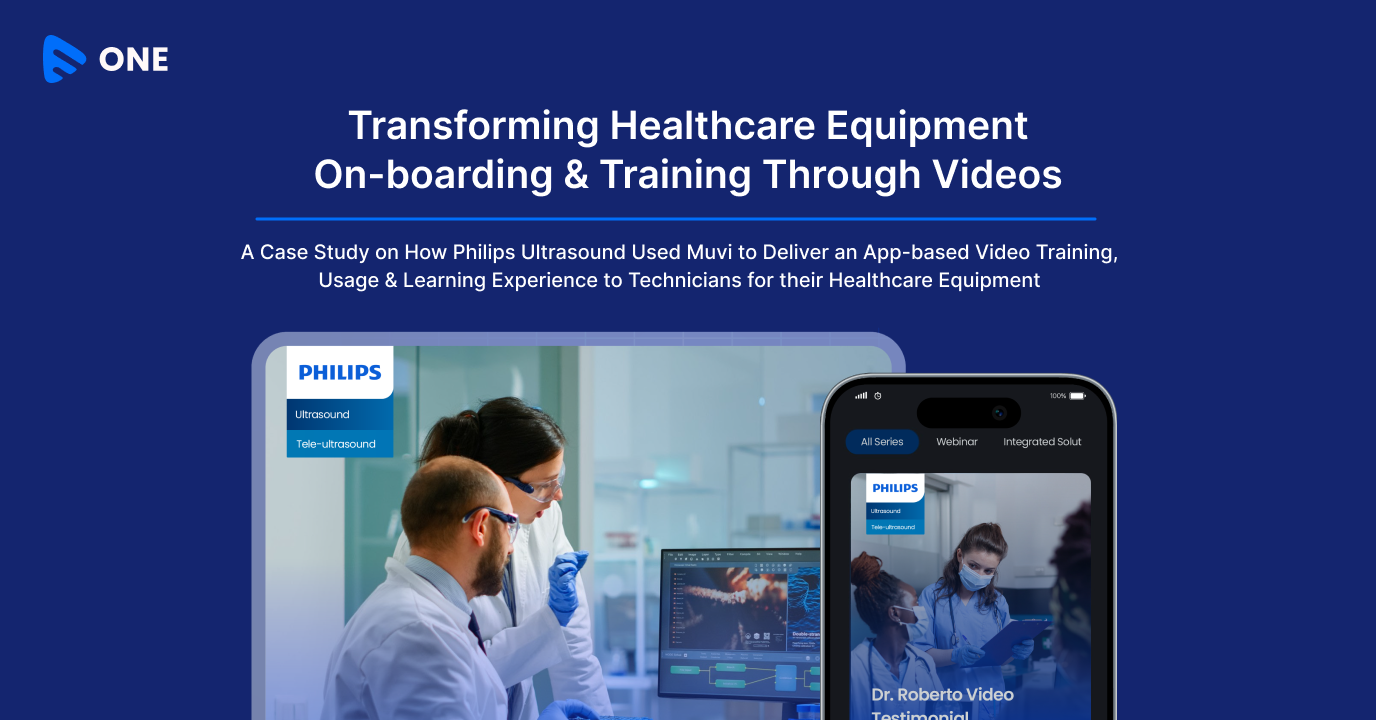




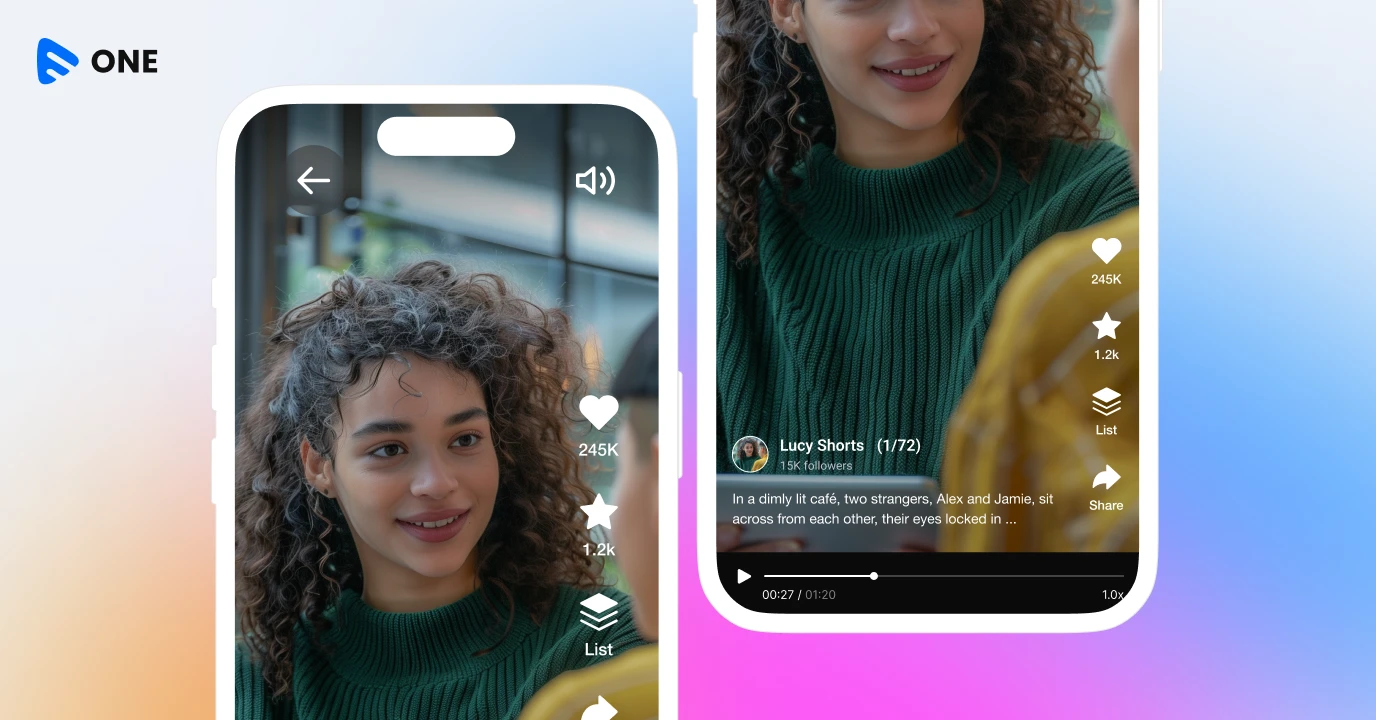
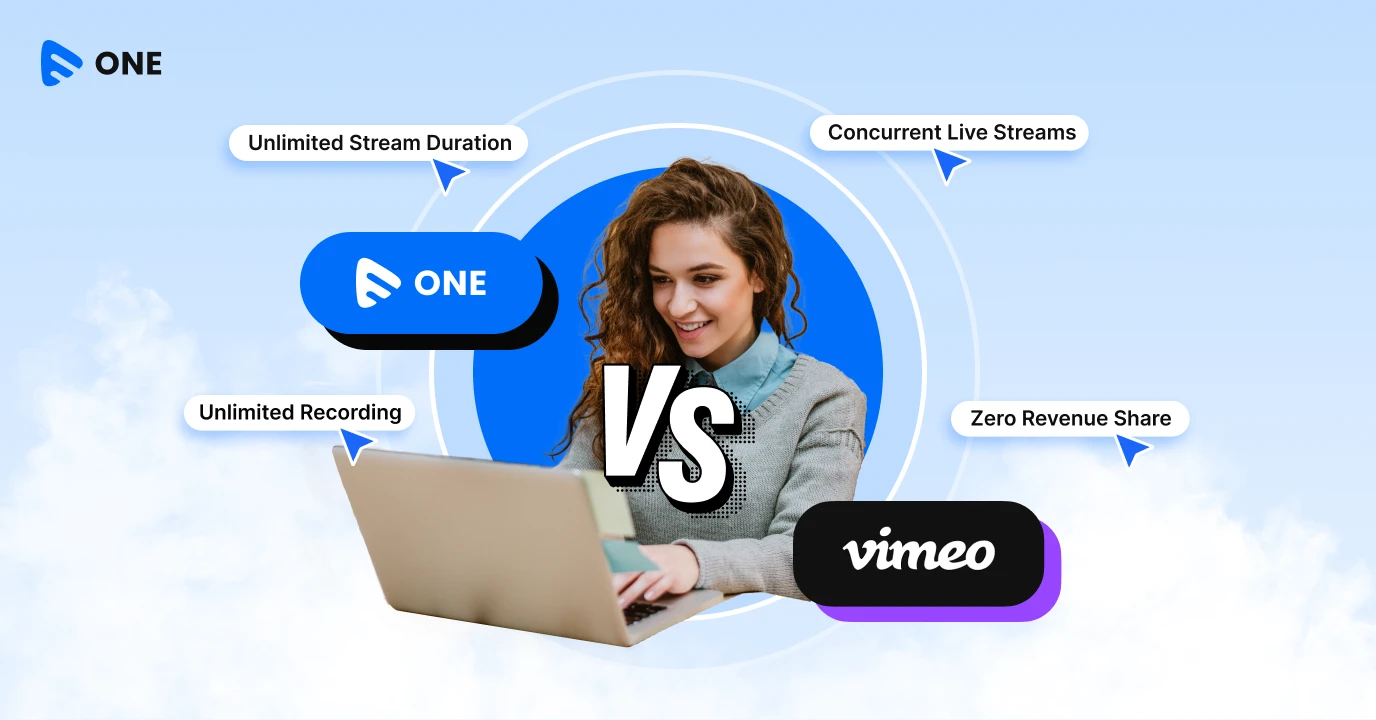
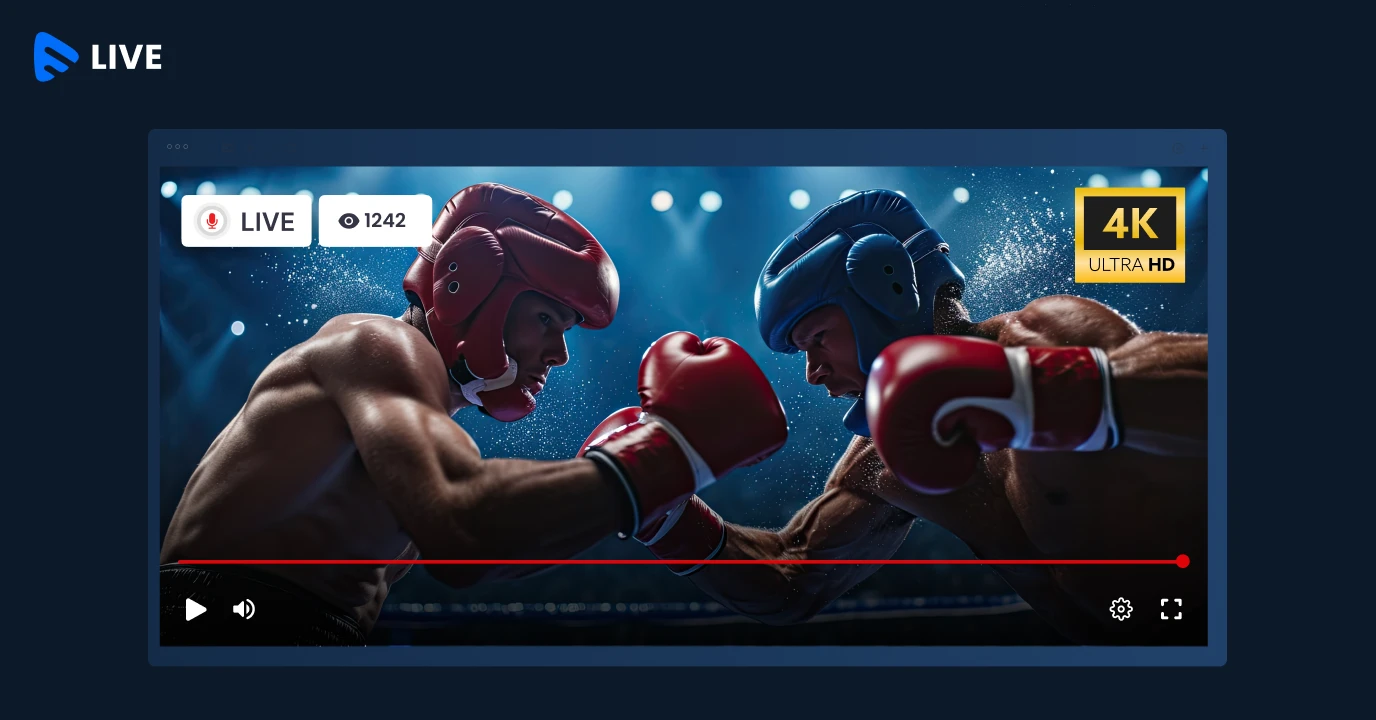

Add your comment